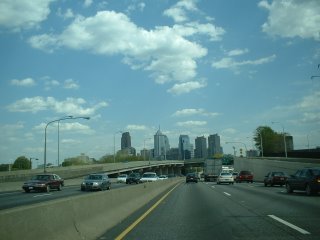
When we think of Philadelphia we think of Philly Cheese Steak Sandwiches but Philly is much more than that! I hear Philadelphia has something important to do with our early history!
For the next few weeks I'll be watching over several CVS resets in the area and of course will explore the area.
At the time the first settlers of European descent arrived in the area now known as Philadelphia, it was inhabited chiefly by Native Americans who called themselves Lenni-Lenape; settlers called them Delawares. Intertribal warfare had weakened the native tribes, and the advance of colonial settlement pushed them farther west, causing great hostility.
The Netherlands laid claim to the area in 1609 when Henry Hudson, an Englishman in the Dutch service, sailed into Delaware Bay, and around 1647 the Dutch began to build trading posts. The Dutch were ousted by the English in 1664.
In 1681 England's King Charles granted William Penn the territory now known as Pennsylvania in exchange for a debt owed Penn's father. Penn, wealthy and well educated, had committed himself to the Society of Friends, also called Quakers, who practiced a form of religion generally regarded by society with suspicion because of its tenets and its insistence upon simplicity in speech and dress. Penn himself had been imprisoned four times for voicing his beliefs, and King Charles was only too happy to be rid of him and his followers.
Although he had been granted all the land in Pennsylvania, Penn chose to buy the claims of any native people still living there, which set a new standard in colonial settlers' relations with Native Americans. Penn dispatched his cousin to lay out a city, which he called Philadelphia, from the Greek for "brotherly love," and which Penn envisioned as a haven for his fellow Quakers to enjoy freedom of worship and the chance to govern themselves. He charged his cousin with laying out a "greene Country Towne, which will never be burnt, and always be wholesome." The city was laid out in a grid, with large lots, wide streets, and a provision for five city parks, four of which still survive. Historians note that Philadelphia was one of the first cities in the New World built according to a plan.
For more on Philly visit: http://www.ushistory.org/philadelphia/philadelphia.html
No comments:
Post a Comment